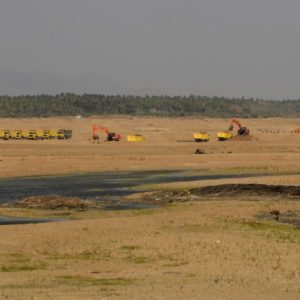The Stream, December 29: China Designs ‘Sponge Cities’ to Combat Flooding
The Global Rundown
A 25-year report on Caribbean waters finds that local environmental management can help keep coastlines healthy. China creates ‘sponge cities’ as a sustainable solution to long-term flood risks. The Government of Guyana issues a flood advisory in preparation for heavy and continuous rainfall. Hurricanes, heatwaves, and other natural disasters are part of a new normal, scientists say. A total of fifteen ‘billion-dollar’ weather events struck the United States in 2017.
“In the past, humans have taken the land away from the water; now we need to give the land back.” –Hui Li, a professor at Shangai’s Tongji University, in reference to China’s “sponge city” initiative. The initiative, which was launched in 2015, focuses on restoring wetlands and building green infrastructure such as rooftop plants and rain gardens. China hopes that these developments will be a sustainable way to combat long-term flooding risks in coastal cities. The Guardian
Latest WaterNews from Circle of Blue
The Year in Water, 2017 – A new era of severe environmental and economic disruption around the world upends freshwater supplies.
Cape Town’s “Day Zero” Approaches – Local authorities estimate that taps will be turned off by April 29, 2018.
By The Numbers
8 Number of U.S. states that experienced record warmth in the first 11 months of 2017. Climate scientists predict that heatwaves, droughts, hurricanes, and other natural disasters will be the ‘new normal.’ The Guardian
15 Number of weather events that took place in the United States in 2017 that cost $1 billion or more, causing economic losses of more than $210 billion. Bloomberg
Science, Studies, And Reports
The Smithsonian Tropical Research Institute recently released 25 years of data about the health of Caribbean coasts. Although some damage to the coastal ecosystems was detected, the study found that local regulations on pollution and runoff were keeping many parts of the coastline healthy. Scientists did not detect significant increases in water temperature, which was expected due to global warming. Science Daily
On The Radar
Guyana’s Civil Defense Commission website issued a flood advisory in preparation for heavy rainfall across the country. Residents have been warned to stay out of floodwaters, plan evacuation routes, and stockpile safe water. Relief Web
Kayla Ritter is a recent graduate of Michigan State University, where she studied International Relations and Teaching English to Speakers of Other Languages. She is currently based in Manton, Michigan. Kayla enjoys running, writing, and traveling. Contact Kayla Ritter




